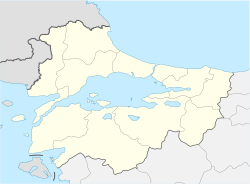Zeleia: Difference between revisions
"See also" section is updated. |
Aadirulez8 (talk | contribs) m v2.05 - Autofix / Fix errors for CW project (Link with encoded space) |
||
| (18 intermediate revisions by 15 users not shown) | |||
| Line 1: | Line 1: | ||
{{Infobox ancient site |
|||
| ⚫ | '''Zeleia''' ({{ |
||
| name = Zeleia |
|||
| native_name = Ζέλεια |
|||
| native_name_lang = gr |
|||
| type = Town |
|||
| coordinates = {{coord|40|12|13|N|27|35|42|E}} |
|||
| map_type = Turkey Marmara#Turkey |
|||
| location = [[Balıkesir]], [[Turkey]] |
|||
}} |
|||
{{Short description|Ancient city}} |
|||
| ⚫ | '''Zeleia''' ({{langx|grc|Ζέλεια}}) was a town of the [[ancient Troad]], at the foot of [[Mount Ida (Turkey)|Mount Ida]] and on the banks of the river [[Aesepus]] (both located in [[Turkey]]), at a distance of 80 [[stadion (unit)|stadia]] from its mouth.<ref name=Strabo>{{Cite Strabo|xii. p.565, xiii. pp. 585, 587, 603}}</ref><ref>{{Cite Stephanus|''s.v.''}}</ref> It is mentioned by [[Homer]] in the [[Trojan Battle Order]] in the ''[[Iliad]]'', and later when Homer calls it a holy town.<ref>{{Cite Iliad|2.824, 4.103}}</ref> Zeleia led a force of warriors to aid Troy during the [[Trojan War]], led by [[Pandarus]], son of Lycaon (the latter Lycaon not to be confused with [[Lycaon (Troy)|Lycaon, son of Priam]]. It is later related that the people of Zeleia are "Lycians", though the Zeleians are distinct from the Lycians who come from [[Lycia]] in southwestern [[Asia Minor]], led by [[Sarpedon (Trojan War hero)|Sarpedon]] and [[Glaucus (soldier)|Glaucus]]. |
||
[[Arrian]] mentions it as the headquarters of the [[ancient Persia|Persian]] army before the [[Battle of the Granicus]], in May 334 BCE, where the [[Persia]]n [[satrap]]s held a council at Zeleia where they discussed how best to confront [[Alexander the Great]].<ref>[[Arrian]] ''[[Anabasis Alexandri]]'' 1.13</ref> It existed in the time of Strabo; but afterwards it disappears.<ref name=Strabo/> |
|||
| ⚫ | |||
| ⚫ | |||
| ⚫ | Arthmios ({{langx|grc|Ἄρθμιος}}, Aryan-Luvian meaning ''truly mine'' or ''my perfect one'') of Zeleia together with his family, was declared an outlaw in the territory of Athens and her allies, because he had brought the gold from [[Persian Empire]] into [[Peloponnese]].<ref>[https://www.perseus.tufts.edu/hopper/text?doc=urn:cts:greekLit:tlg0007.tlg010.perseus-grc1:6 Plutarch, Life of Themistocles, §6]</ref> |
||
| ⚫ | |||
| ⚫ | |||
| ⚫ | |||
== See also == |
== See also == |
||
| ⚫ | |||
| ⚫ | |||
==References== |
==References== |
||
| Line 16: | Line 27: | ||
{{Former settlements in Turkey}} |
{{Former settlements in Turkey}} |
||
{{Authority control}} |
{{Authority control}} |
||
{{coords|40.2035643|N|27.5950731|E|display=title|format=dms|source:http://dare.ht.lu.se/places/21540}} |
|||
[[Category:Populated places in ancient Troad]] |
[[Category:Populated places in ancient Troad]] |
||
| Line 26: | Line 34: | ||
[[Category:Members of the Delian League]] |
[[Category:Members of the Delian League]] |
||
[[Category:Holy cities]] |
[[Category:Holy cities]] |
||
[[Category:History of Balıkesir Province]] |
|||
{{AncientTroad-geo-stub}} |
|||
Latest revision as of 20:52, 26 November 2024
Ζέλεια | |
| Location | Balıkesir, Turkey |
|---|---|
| Coordinates | 40°12′13″N 27°35′42″E / 40.20361°N 27.59500°E |
| Type | Town |
Zeleia (Ancient Greek: Ζέλεια) was a town of the ancient Troad, at the foot of Mount Ida and on the banks of the river Aesepus (both located in Turkey), at a distance of 80 stadia from its mouth.[1][2] It is mentioned by Homer in the Trojan Battle Order in the Iliad, and later when Homer calls it a holy town.[3] Zeleia led a force of warriors to aid Troy during the Trojan War, led by Pandarus, son of Lycaon (the latter Lycaon not to be confused with Lycaon, son of Priam. It is later related that the people of Zeleia are "Lycians", though the Zeleians are distinct from the Lycians who come from Lycia in southwestern Asia Minor, led by Sarpedon and Glaucus.
Arrian mentions it as the headquarters of the Persian army before the Battle of the Granicus, in May 334 BCE, where the Persian satraps held a council at Zeleia where they discussed how best to confront Alexander the Great.[4] It existed in the time of Strabo; but afterwards it disappears.[1]
Arthmios (Ancient Greek: Ἄρθμιος, Aryan-Luvian meaning truly mine or my perfect one) of Zeleia together with his family, was declared an outlaw in the territory of Athens and her allies, because he had brought the gold from Persian Empire into Peloponnese.[5] Nicagoras (Ancient Greek: Νικαγόρας) of Zeleia, was a tyrant of Zeleia.[6]
The site of ancient Zeleia is located near Sarıköy, Balıkesir, Turkey.[7][8]
See also
[edit]References
[edit]- ^ a b Strabo. Geographica. Vol. xii. p.565, xiii. pp. 585, 587, 603. Page numbers refer to those of Isaac Casaubon's edition.
- ^ Stephanus of Byzantium. Ethnica. Vol. s.v.
- ^ Homer. Iliad. Vol. 2.824, 4.103.
- ^ Arrian Anabasis Alexandri 1.13
- ^ Plutarch, Life of Themistocles, §6
- ^ Athenaeus, Deipnosophists, §7.288
- ^ Richard Talbert, ed. (2000). Barrington Atlas of the Greek and Roman World. Princeton University Press. p. 56, and directory notes accompanying. ISBN 978-0-691-03169-9.
- ^ Lund University. Digital Atlas of the Roman Empire.
![]() This article incorporates text from a publication now in the public domain: Smith, William, ed. (1854–1857). "Zeleia". Dictionary of Greek and Roman Geography. London: John Murray.
This article incorporates text from a publication now in the public domain: Smith, William, ed. (1854–1857). "Zeleia". Dictionary of Greek and Roman Geography. London: John Murray.


